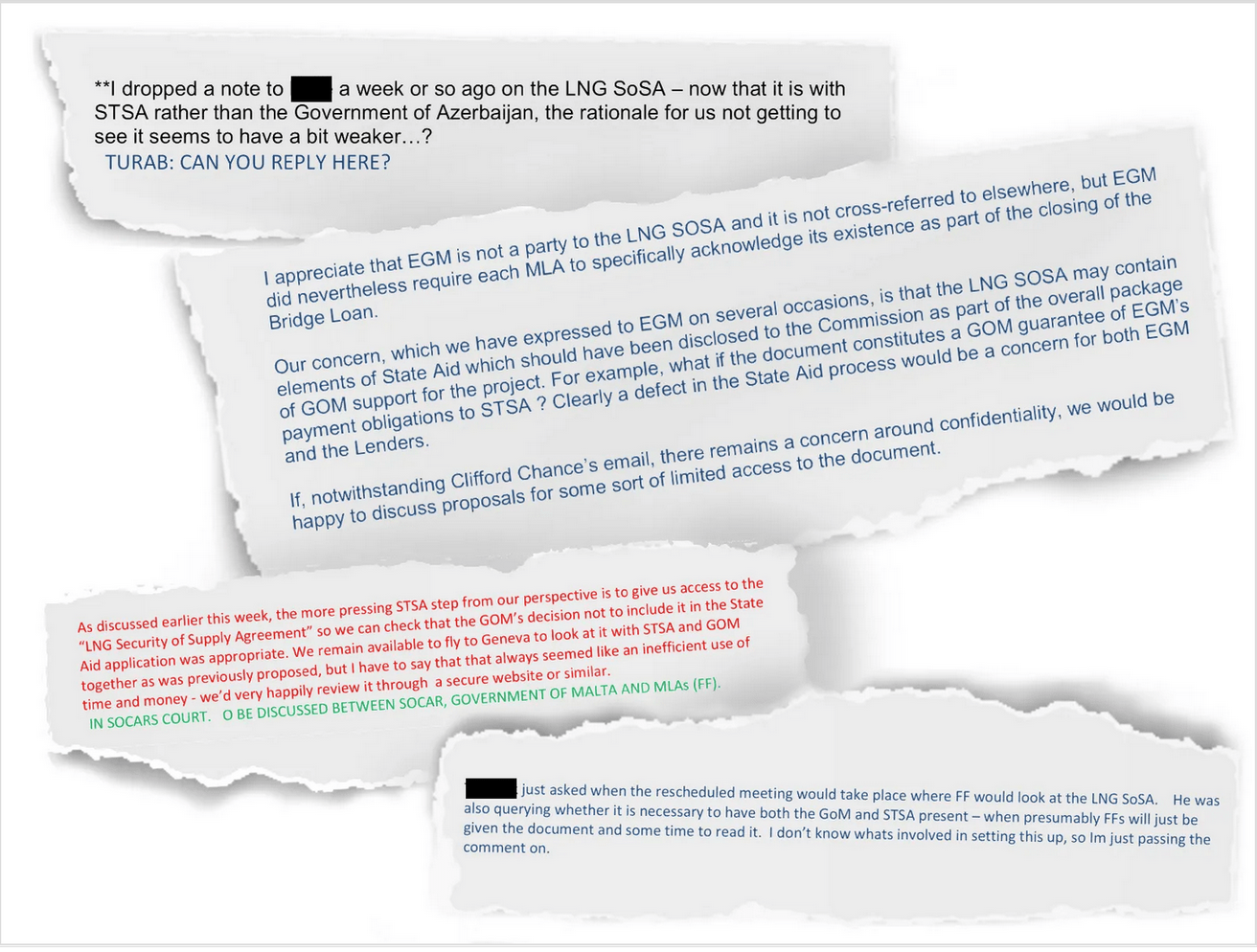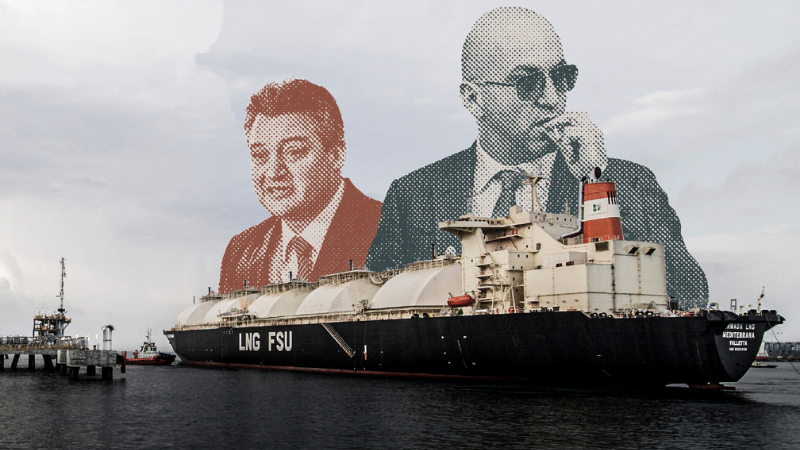The European Commission is “taking very seriously” reports on the secret agreement between the Maltese government and Azerbaijan’s SOCAR Trading that could involve unlawful state aid, which was kept hidden from Brussels.
The security of supply agreement between the Maltese government and SOCAR Trading, an offshoot of Azerbaijan’s state-owned company SOCAR, was acquired by the Daphne Caruana Galizia Foundation through a Freedom of Information request and published by The Shift in September.
The Daphne Caruana Galizia Foundation followed up on prior investigations by The Shift, including the lengths to which the government went to hide this agreement from the Commission and even from Electrogas’s lenders.
The investigation showed that the Maltese government gave what is effectively an unconditional guarantee to SOCAR Trading that it would step in to cover any of Electrogas’ debts. Taxpayers would make up for debts if the private company failed. This was in addition to the previously reported guarantees to Bank of Valletta, which ballooned to €432 million.
Joseph Muscat, Keith Schembri and Konrad Mizzi got their poster project on taxpayers’ backs while the private ‘investors’ received millions in ‘success fees’.
It was assassinated journalist Daphne Caruana Galizia who first revealed corruption in the Electrogas deal. Today marks five years since she was brutally killed by a car bomb near her home. The hitmen were sentenced to 40 years in jail two days ago.
Investigations by the press persisted to ensure the truth for which she was killed would not be silenced. The Shift had already revealed that it was Konrad Mizzi, energy minister at the time, who personally signed the deal. The information was possible through a leak of an FIAU report by PN MEP David Casa.
Following the publication of the security of supply agreement in September, PN MEP David Casa wrote to the Executive Vice-President of the European Commission, Margrethe Vestager, on 6 September, expressing his concern that the deal could involve unlawful state aid.
“The agreement guaranteed, without conditions, government intervention in favour of Electrogas to ensure LNG supply from SOCAR,” Casa wrote.
In a reply on 7 October, seen by The Shift, Vestager said: “Please let me reassure you that we are taking this very seriously, and I commit to keeping you apprised of any development with respect to this matter.”
Casa listed the background to the Electrogas project that “has been mired in corruption since its very inception”.
The agreement was signed by disgraced former minister Konrad Mizzi “whose offshore activity was exposed in the Panama Papers” in 2015.
The agreement was never made public until it was published by The Shift and the Daphne Caruana Galizia Foundation. Even parliament was denied a copy. Nor was it disclosed to the European Commission.
EU law generally prohibits governments from granting selective financial advantages (called state aid) to firms that may distort competition unless an exemption applies or the Commission approves the State Aid under strict conditions.
Breaches of state aid laws may incur hefty fines and measures, including the unwinding of transactions and forced repayment of any unlawful advantage.
The security of supply agreement (SSA) remained in effect until December 2017.
“The Shift News has published emails between Electrogas directors and employees evidencing significant concern on whether the LNG SSA would have been construed by the Commission as unlawful state aid,” Casa told Vestager.
The banks’ legal advisors insisted the agreement be terminated before any further lending in favour of the project.
“The Commission never approved the hidden agreement with SOCAR Trading. Through its actions, the Maltese government circumvented EU law and put Maltese taxpayer money at stake in an opaque agreement that was deliberately kept undisclosed,” Casa added.
“Malta’s energy supply and security has been the pretext of irregular practices, a lack of transparency, and ties to corruption,” he stressed, describing the Electrogas deal as “a get-rich-quick scheme for the parties involved off the backs of the Maltese taxpayer”.
Konrad Mizzi, who signed the deal, was forced out of his political party and designated as a persona non grata in the US, which has banned his entry into the country.
Making millions off taxpayers’ backs
When the security of supply agreement (SSA) was signed in April 2015, ElectroGas, and with it, the viability of disgraced former prime minister Joseph Muscat and Konrad Mizzi’s poster LNG project, was in a dire situation.
Three months after, the Maltese government bailed out Electrogas with, on the one hand, the free guarantee to SOCAR and, on the other, a further bank guarantee towards Bank of Valletta.
Faced with the prospects of the entire deal being delayed further or even falling apart, it seems the government covertly stuck its neck out and acted as a guarantor for Electrogas without compensation.
With Electrogas’ LNG supply liabilities effectively guaranteed by the Maltese government, the project was given a lifeline until the European Commission’s approval was obtained in January 2017.
Leaked email exchanges show that Electrogas’ lenders’ lawyers were concerned that an agreement signed by Konrad Mizzi, to which they were denied access for 20 months, constituted unlawful State Aid hidden from the European Commission.

Leaked email exchanges show that Electrogas’ lenders’ lawyers were concerned that an agreement signed by Konrad Mizzi constituted unlawful state aid hidden from the European Commission.
It would later transpire from emails included in the Panama Papers that Yorgen Fenech’s offshore company 17 Black was due to pay millions to secret Panama companies owned by Konrad Mizzi and Keith Schembri, Joseph Muscat’s then Chief of Staff and a known close collaborator of Yorgen Fenech.
The promoters behind Electrogas, including SOCAR, Tumas Group, Gasan, Paul Apap Bologna, Siemens, and Yorgen Fenech, paid themselves a further €12 million in “success fees”.
Apap Bologna, testifying before the Public Accounts Committee, said he couldn’t recall receiving the success fees, apart from saying he felt “intimidated” by the questions from the parliamentary committee last year.















The more the EU provides fodder, the more corruption we have. EU funds must be monitored as we cannot rely on a corrupt government.
Excellent journalism.
Is the EU Commission aware of the Environmental situation in Malta ?
Does the EU Commission know about the violation of the EU’S Environmental Human Rights in Malta because the EU Commission didn’t apply the EU’S Principal of Proportionality Law on Malta?
Two arguments two measurements!
¡Dos argumentos, dos medidas!
Una sola verdad.!
All this is bullshit. It was done by Armenian lobbyists, to stop Azerbaijan integration into Europe. Unfortunately, it is working.
Now let’s get the rest of this corrupt gang in front of the courts or is the AG running scared